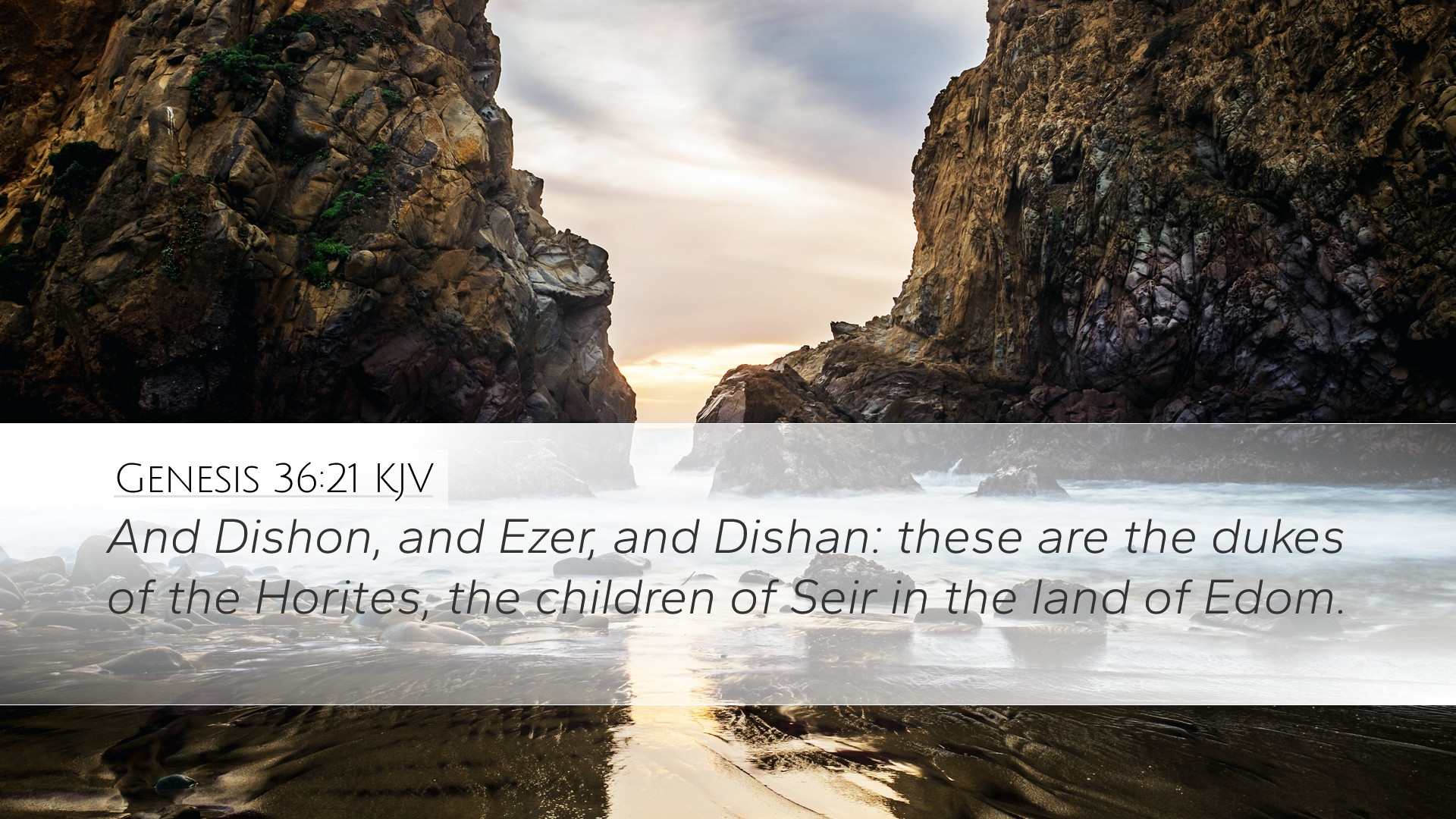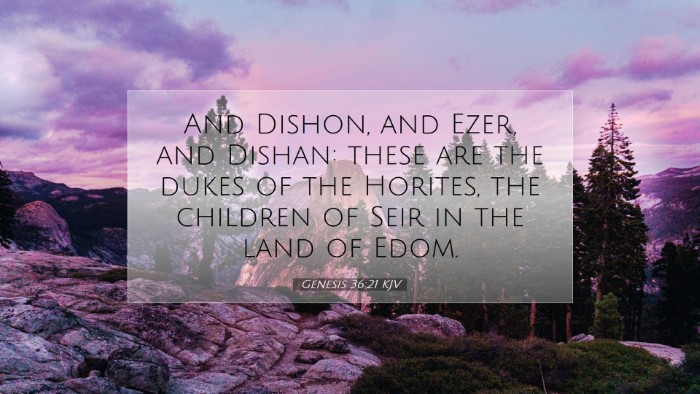Commentary on Genesis 36:21
Verse: "These are the sons of Dishan: Hemdan, Eshban, Ithran, and Cheran."
Introduction
The genealogies in the Book of Genesis serve various purposes, including establishing lineage, validating divine promises, and revealing the complexities of familial relationships. Genesis 36 specifically centers on the descendants of Esau, providing insight into the development of nations and tribes descended from him. The mention of Dishan's sons signifies both the continuity of Esau's lineage and the rich tapestry of family structures that contributed to the greater narrative of God’s covenantal purposes.
Insights from Matthew Henry
Matthew Henry emphasizes the importance of genealogical records in Scripture, noting that they are not simply lists of names but carry significant historical and theological weight. In reference to Genesis 36:21, Henry points out that the sons of Dishan represent different facets of the Edomite lineage. He indicates that names and their meanings often reveal character traits or the disposition of the descendants, emphasizing the significance of each name in the context of Hebrew culture.
Furthermore, Henry reflects on the broader implications of Esau's descendants. He notes that the Edomites, arising from Esau’s line, would play a crucial role in the interactions with the Israelites. This lineage, therefore, carries an undercurrent of rivalry and ancestral tension, which is noteworthy in the narrative of the people of God.
Insights from Albert Barnes
Albert Barnes provides an in-depth analysis of the tribal structure presented in Genesis 36. He notes that the sons of Dishan—Hemdan, Eshban, Ithran, and Cheran—represent distinct families within the Edomite clans. Barnes emphasizes that these familial divisions speak to the growth and complexity of the Edomite nation, which became prominent in the surrounding regions.
Barnes also highlights the socio-political implications of this expansion. The establishment of tribes signifies not just a familial lineage but also the formation of a significant political entity that would have interactions, conflicts, and alliances with Israelite tribes. This context serves as a reminder that the covenant with Abraham extends beyond immediate descendants, affecting future generations and nations.
Insights from Adam Clarke
Adam Clarke focuses on the cultural and historical context of Genesis 36:21, examining the meanings of the names presented. He points out that each name may reflect personal or familial traits, which were significant in ancient cultures. Clarke explains that understanding the meanings could provide insights into the characteristics attributed to the Edomite families, possibly hinting at their roles within the broader narrative of Israel's history.
Moreover, Clarke discusses the implications of this genealogy for contemporary readers, particularly in understanding the complexities of Biblical history and the interconnectedness of various nations. He emphasizes that the descendants of Dishan and other Edomites are part of a divine plan that unfolds throughout Biblical history, playing critical roles in the unfolding story of redemption.
Theological Reflection
The genealogy in Genesis 36, and specifically the mention of Dishan's sons, invites us to reflect on several theological themes:
- God's Sovereignty: The detailed lineage demonstrates God's sovereign plan in the rise and fall of nations, as well as His overarching purpose in history.
- Human Relationships: The interactions between the descendants of Esau and Jacob underscore the complexities of familial and national relationships that impact the narrative of Scripture.
- Divine Promises: The mention of these tribes reassures believers of God's faithfulness in fulfilling His promises, as seen through the establishment of nations that stem from the covenantal line.
Application for Today
The passage challenges us to consider our own heritages and how our backgrounds influence our faith journeys. As pastors, theologians, and students of the Bible, we can draw parallels from the genealogical records to understand the importance of our communities today. Each name in the lineage of Esau not only contributes to the narrative but also speaks to the diversity of the body of Christ, reminding us that God works through various backgrounds and histories to accomplish His purposes.
Furthermore, studying the interactions and tensions between Edom and Israel presents an opportunity for reflection on our own relationships. Just as these ancient tribal connections influenced God's people, our interpersonal relationships in the modern church can significantly impact the advancement of God's kingdom.
Conclusion
Genesis 36:21 provides more than just a list of names; it opens up avenues for deep theological inquiry and application. By understanding the context and implications of this passage, pastors, students, and scholars can draw valuable lessons on God's sovereignty, the interplay of human relationships, and the expansion of His covenantal promises across generations.


